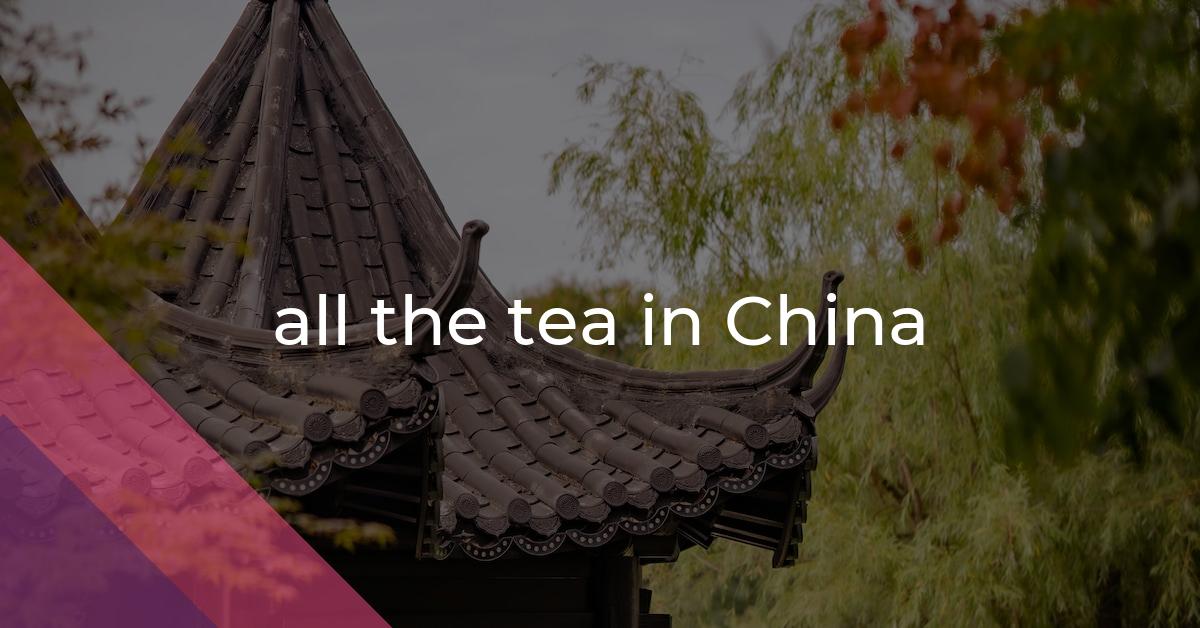all the tea in China: Idiom Meaning and Origin
What does ‘all the tea in China’ mean?
The idiom "all the tea in China" means a very large or extravagant amount of something. It emphasizes the idea of abundance and impossibility of possessing every single thing in a given category.

Idiom Explorer
The idiom "price of tea in China" is used to dismiss or downplay the importance, relevance, or significance of a particular topic or issue.
The idiom "in the world" is used to emphasize something by placing it in a broader context. It implies that there is no greater or more extreme example of that thing anywhere else.
The idiom "in every sense of the word" means that something is true or accurate in every possible way or aspect. It emphasizes the completeness or thoroughness of a particular statement or description.
The idiom "have eyes bigger than one's stomach" means to take or desire more than one can actually consume or handle.
The idiom "go all out" means to put in maximum effort or to do something with full dedication and enthusiasm.
The idiom "for all the world" means in the strongest or most obvious way. It is used to emphasize the certainty or truth of a statement or situation.
The idiom "for all one is worth" means to do something with all of one's ability or effort, often in a desperate or determined manner.
The idiom "all told" means when considering everything or in total. It is used to emphasize that all aspects or elements have been taken into account.
China's Enigmatic Tea Wealth
The idiom "all the tea in China" is a colorful expression that signifies a significant quantity or amount. It has been widely used in the English language for several years to emphasize immense value or abundance.
The phrase originated in the 19th century when tea from China was highly sought after in Western countries. As the birthplace of tea, China had a monopoly on its production and export, making tea from China incredibly valuable. The idiom "all the tea in China" was coined to convey the vastness and worth of something, as tea from China was considered to be of great value.
Over time, the idiom gained popularity and became a well-known expression in English-speaking countries. While the exact origins of the phrase are unclear, it is believed to have originated during the period when British traders began importing large quantities of tea from China.
Furthermore, the idiom "all the tea in China" has evolved and adapted to different contexts throughout history. Initially, it was primarily used to refer to material wealth or possessions. For example, it was commonly said that someone would not trade "all the tea in China" for something of lesser value. However, the idiom has also taken on a metaphorical meaning, symbolizing any situation involving an immeasurable or unattainable quantity.
It is worth noting that the idiom has also changed to reflect cultural and societal shifts. In modern usage, variations such as "all the coffee in Colombia" or "all the oil in Saudi Arabia" are not uncommon. These variations highlight the significance and abundance of specific commodities in those regions.
It is essential to understand that the idiom "all the tea in China" should not be interpreted literally. Instead, it relies on its established cultural and historical associations to convey the intended meaning.
Looking at the idiom's longevity and widespread usage, it is evident that it has become an integral part of the English language. It serves as a vivid and expressive way to emphasize the vastness or value of something. While the phrase originated within the context of tea trade with China, it has transcended its original boundaries and become a versatile idiom applicable to various situations and subjects.
When exploring the related idioms, it is interesting to see how they intersect with the idiom "all the tea in China."
The first idiom, "price of tea in China," refers to something insignificant or unimportant. It draws from the idea that in a country like China, where tea is of enormous value, the price of tea would be a trivial matter. This idiom adds an ironic twist by highlighting that in a place where tea is highly valued and cherished, the price itself is inconsequential.
The second idiom, "all over," means that something is finished or complete. It can be seen as a variant of the idiom "all the tea in China." Both idioms convey a sense of abundance or completeness, albeit in different contexts. While "all the tea in China" emphasizes the sheer volume or value of something, "all over" suggests that a particular situation or action has reached its culmination.
The third idiom, "be-all and end-all," refers to something that is of ultimate importance, essential, or the sole objective. This idiom is similar to "all the tea in China" in that it signifies the utmost significance or value attributed to a particular thing or goal. While "be-all and end-all" implies that something is the ultimate determinant or goal, "all the tea in China" suggests that something is of immeasurable value.
The idiom "all the tea in China" has a rich history and has become a versatile expression in the English language. It symbolizes an immense quantity or worth and has evolved to encompass a broader meaning. It is not to be taken literally but is instead a figurative expression. The related idioms "price of tea in China," "all over," and "be-all and end-all" share connections with the idiom, as they all involve significance, abundance, or value in different ways.
Example usage
Examples of how the idiom "all the tea in China" can be used in a sentence:
- She refused to disclose her secret recipe, saying she wouldn't give it up for all the tea in China.
- He was so dedicated to his work that he wouldn't take a day off for all the tea in China.
- They were ready to risk everything to win the lottery, believing it would give them all the tea in China.
More "colloquial" idioms



